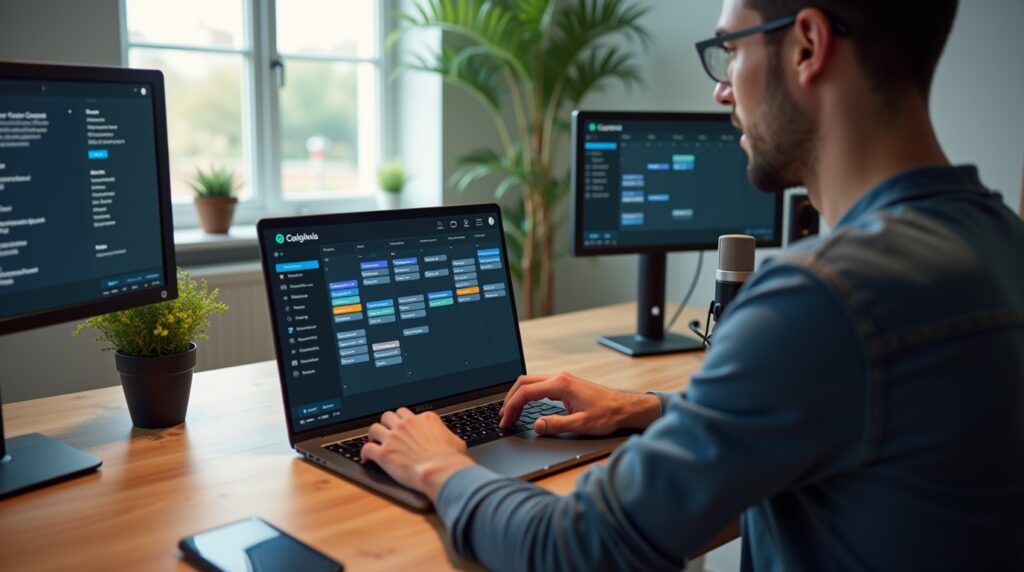🎯 Why You Need a Stream Content Plan (Not Just a Schedule)
If you’re a creator who’s ever asked, “What am I even streaming this week?”, you’re not alone. While having a streaming schedule helps with consistency, having a content plan is what gives your streams direction, purpose and long-term sustainability.
💡 Planning ahead also makes it easier to include accessibility features like captions, alt text, and clear visuals so more people can enjoy your content — see our Getting Started with Accessibility guide for beginner-friendly tips.
A well-structured content plan helps you:
- Stay organized and aligned with your goals
- Avoid creative ruts or repeating the same format
- Make space for breaks without losing momentum
- Create content that’s more engaging and monetizable
💡 If you’re still struggling with your day-to-day streaming routine, it might help to revisit our streaming schedule habits before tackling long-term planning.
🧱 Step 1: Define Your Pillars — What Are You Really Streaming?
Start by identifying 2–4 core content pillars — recurring themes or formats that anchor your stream.
🎵 Examples:
- Gaming streams (Let’s Plays, ranked matches, new releases)
- Music content (jam sessions, songwriting, gear reviews)
- Behind-the-scenes/IRL content
- Community hangouts or Q&As
👉 These pillars give your audience something familiar to return to, while still giving you creative flexibility.
⏱️ If you’re serious about consistency, consider building content themes and series using analytics — we’ve got a full guide to help.
📅 Step 2: Map It Out Monthly (Not Daily)
Instead of planning content day by day, zoom out and use a monthly planning board. This avoids the burnout of overly rigid planning.
🗓️ Try This Structure:
- Week 1: Highlight new content (game release, new track, etc.)
- Week 2: Deep-dive content or tutorials
- Week 3: Interactive or community-driven streams
- Week 4: Low-effort or recharging content (reaction, AMA, collabs)
This approach keeps things fresh without demanding 100% new energy every week.
📌Titles are one of the most overlooked parts of a content plan. Here’s our list of stream title optimization tools that actually deliver results.
🔁 Step 3: Reuse, Repurpose, Remix
You don’t need to reinvent the wheel each time you stream.
♻️ Sustainable content ideas:
- Clip your VODs into short-form content
- Turn long streams into series
- React to old content or community submissions
- Remix a past idea with a new twist
Not only does this stretch your ideas further, it also helps feed your off-stream content on platforms like YouTube, TikTok or Instagram.
🧠 Step 4: Use Analytics to Spot What’s Working
Once you’ve been following your plan for a few weeks, revisit your viewer analytics to fine-tune what comes next.
📊 Look for:
- What content gets the most engagement or chat activity?
- Where do viewer counts drop off?
- What do people ask for more of?
💡 Need help decoding your analytics? Check out our guide on identifying your best performing content.
🧘♀️ Step 5: Leave Room for Life (and Downtime)
Your stream content plan is there to serve your creativity — not control it. Be sure to leave space for:
- Sick days, burnout or breaks
- Spontaneous collabs or trends
- Personal life and rest
Consider building in a “buffer week” each month or labeling certain weeks as “low output” — it’s better than disappearing unannounced.
💬 Want more ideas on how to balance creativity with self-care? Our post on streamer wellness tips has your back.
🔗 Final Thoughts: From Guesswork to Growth
A good content plan helps you show up with purpose, not panic. It frees you from scrambling for ideas and gives your audience a consistent, meaningful experience.
Whether you’re streaming full-time or just a few hours a week, a flexible content strategy can be the difference between chaos and clarity.
📌 TL;DR — Content Planning Tips for Streamers
- 🎯 Choose your pillars: Stick to 2–4 recurring content themes
- 🗓️ Zoom out: Plan in months, not days
- 🔁 Repurpose content: Work smarter, not harder
- 📊 Use analytics: Let data guide your decisions
- 🧘♀️ Protect your energy: Build in flexibility
